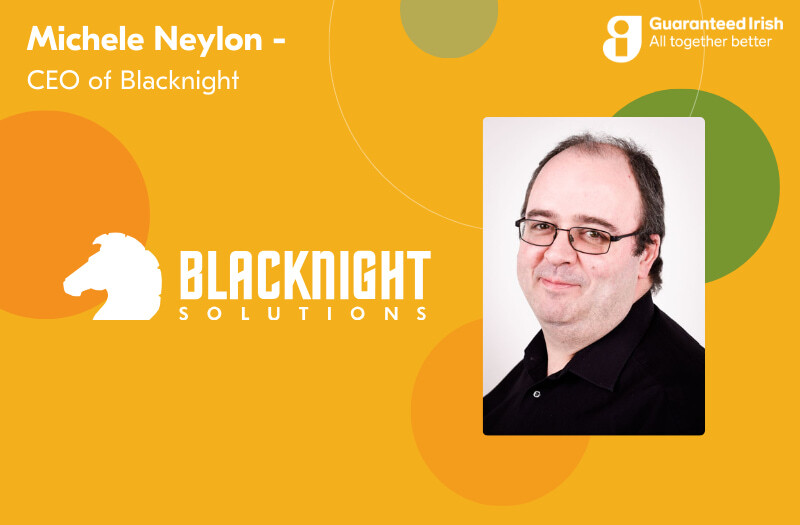Thought Leadership with Michele Neylon, CEO of Blacknight
In an increasingly connected world, having a solid digital foundation isn’t just a nice to have, it’s essential. For Irish businesses, the challenge isn't just getting online; it's staying in control. Michele Neylon, CEO of Blacknight, Ireland’s leading domain and web hosting provider, shares his perspective on why owning your online presence is vital, the risks of over reliance on big tech platforms, and how Ireland is uniquely positioned to thrive as a global digital hub.
Why is it critical for businesses to have control over their online presence rather than relying solely on social media platforms?
If your entire business lives on a social platform, you're building on rented land. One algorithm change, or some automated system flagging your content, and your presence can vanish overnight, and good luck getting someone at a big tech company to help.
Too often I see businesses, especially smaller ones, invest time, money, and effort into growing their brand on a social media platform, and then it disappears overnight because of an automated decision or a hack. When you’ve built your own website, set up email addresses on your own domain, and created content that lives on your space, you’re in control. You set the tone. You decide what stays up or comes down. Social platforms are useful tools, but they shouldn’t be the foundation. Having your own website and domain means you're in control. It’s your brand, your audience, your rules.
What are the biggest risks businesses face when building their brand entirely on platforms controlled by large tech companies?
You're basically at the mercy of a faceless tech giant. If your page gets hacked or flagged and that happens far more often than people realise, you can find yourself locked out with no real path to support. You end up going in circles with automated systems, and meanwhile your customers might think you’ve disappeared, or worse, that you’re not trustworthy. The reputational damage can be massive, especially if someone hijacks your account and starts posting spam or scams.
Now, don’t get me wrong! Social media can be a very effective tool for marketing. A lot of small businesses rely on it to connect with their audience, and that’s fine. But the mistake is in making it your only platform. You don’t own your Facebook page. You don’t own your Instagram followers. Those platforms can change the rules at any moment, limit your reach, or even shut you down with no notice.
What you do own is your website, your domain, your email list. That’s your digital foundation. Social media should be there to support and amplify your message, not be the message itself. Build your brand on solid ground, and use those platforms as distribution tools, not as your base of operations. It’s the difference between owning your own shop and renting a booth in someone else’s market, you’ve got to protect your long-term future.
How can businesses better protect their digital identities and customer data in an age of increasing cyber threats?
Simple steps like using secure passwords and enabling two-factor authentication (2FA) go a long way. It might sound basic, but the number of businesses even well-established ones that still use the same weak passwords across multiple platforms is frightening. And without 2FA, you're just one phishing email or leaked password away from a serious breach. These are easy wins, but they're often overlooked.
Beyond that, think about who you’re trusting with your data. When you choose a service provider, you’re essentially handing over your data, your reputation, and in some cases, your entire business operations. That’s why I always advocate for working with local, privacy focused providers whenever possible. Irish and EU-based companies are subject to GDPR, which gives you strong legal protections as a customer. And let’s be honest, if something goes wrong, you’re much better off dealing with someone who speaks your language, operates in your time zone, and actually picks up the phone. Security isn’t just about firewalls and encryption; it’s about trust, transparency, and having real people you can rely on when things go sideways.
Ireland has become a digital gateway to Europe. How can Irish businesses leverage this for global success?
There’s been a lot of talk about “Big Evil Tech,” and while there are valid concerns around data, privacy, and control, that conversation needs to be turned on its head. We should be looking at all the positives those big tech companies have brought to our economy by choosing Ireland as their home. They’ve brought billions in revenue, thousands of jobs, and significant investment in infrastructure. Just look at Apple’s HQ in Cork; it’s been central to their overseas strategy for years.
But we also need to invest in our own capabilities. Ireland has an incredible talent pool across multiple sectors; tech, engineering, digital services, and it’s more important than ever that we harness that by building homegrown solutions to meet complex business needs.
Ireland is perfectly positioned, both geographically and digitally to act as a global hub. We’re the only English-speaking country in the EU, which is a massive asset. We’ve got excellent fibre connectivity, competitive data centre infrastructure, and a legal and regulatory framework that businesses can trust. Irish businesses have everything they need to serve a global audience, now it’s about using those tools strategically.
With the shift to remote work and decentralised teams, what role does digital infrastructure play in regional development?
Twenty years ago, if you wanted to work in tech, you had to move to Dublin or Cork. Now? You can run a global business from a spare room in Donegal. Fibre connectivity and robust digital infrastructure have completely changed what’s possible in rural Ireland. That’s not just good for business, it’s good for the entire country. It helps decentralise opportunity and spread economic growth more evenly.
Remote and hybrid work have also made us rethink where we put our infrastructure. Running servers in the corner of the office might’ve been fine a decade ago, but these days, with teams spread out and security becoming more of a concern, putting your hardware in a proper data centre just makes more sense. It’s about having the right setup for how we work now — not how we used to.
And this isn’t just about cables and connectivity. It’s about creating the conditions for people and businesses to thrive wherever they are. You can build something meaningful from anywhere — which is great for local communities and the economy as a whole. It’s not just about tech anymore; it’s about enabling people to thrive, wherever they are.
Learn more about Blacknight Internet Solutions.


